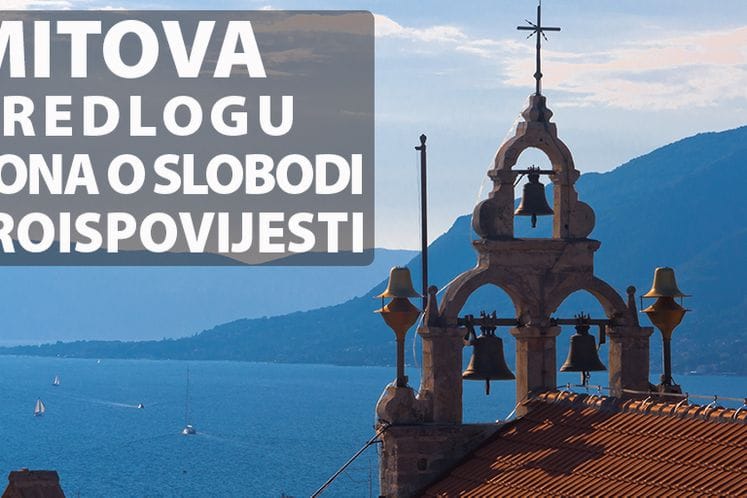- Government of Montenegro
5 myths about Draft law on freedom of religion
Please note: The page below represents the archived content relating to the previous Government of Montenegro. Some of the information might be inaccurate or outdated.
Archive
5 myths about Draft law on freedom of religion

Published on: Dec 22, 2019 • 11:00 PM Author: PR Service
Myth: "State seizes property of religious communities"
Truth: This law establishes the simple legal fact that cultural treasures created over the centuries from state money belong to the state, that is, to all citizens. Therefore, only religious property that represents a cultural property, acquired from the state revenue, or was state-owned until the loss of independence of Montenegro in 1918, will be registered as state property. And only on condition that there is no evidence that a religious community has the right to own the property. On the other hand, if a religious community has acquired certain property in accordance with the law that is in force today, or that was once in force, the state will respect it.
Myth: "The Serbian Orthodox Church is older than the state of Montenegro and all Orthodox religious sites in Montenegro are in its property"
Truth: At the time of the Principality and later of the Kingdom of Montenegro, the Serbian Orthodox Church, as a legal entity under that name, did not exist. The property used by the Orthodox Church in the territory of Montenegro before 1918 was state-owned property, as evidenced by the fact that the religious community never had the right to dispose of the property it used without the consent of the state. Article 719 of the General Property Code for the Principality of Montenegro of 1888 explicitly states: "The immovable property of Orthodox churches and monasteries may in no way be sold or ceded without the permission of the state authority." As the general legal principle, dating back to Roman law, states that property ownership cannot be claimed without the right of disposal, it is quite clear that the state, not the church in Montenegro, owns religious properties. Thus, the church used property and reaped the benefits from religious property, but the owner of that property in the Principality, later the Kingdom of Montenegro, was undoubtedly the state.
Myth: "State forces religious communities to register"
Truth: There is no legal obligation for the religious community to register. However, those religious communities that do not want the competent state authority to record information on their name, headquarters, address and representative will not have all the benefits enjoyed by registered legal entities, that is, they will not have legal entity status. The procedure for registering a religious community is very simple and does not differ from the rules of registration of legal entities that are valid in the Montenegrin legal system.
Myth: "State wants to expel Serbian Orthodox Church (SPC) from Orthodox temples and bring Montenegrin Orthodox Church (CPC) instead"
Truth: The best confirmation that by establishing state ownership of religious cultural property the state does not intend to jeopardize the rights of believers is the fact that the Old Royal Capital Cetinje, and not the SPC, is registered as the owner of the Cetinje monastery, which in no way restricts the rights and freedoms of the clergy and believers of the SPC in one of the most important cultural, historical and religious buildings in Montenegro. Thus, the proposed law establishes the property owernship of the state over religious objects that the state itself has built and acquired over the centuries and which represent the cultural heritage and property of all citizens of Montenegro. This law does not regulate religious life within any religious object, nor does it expel or move anyone into religious objects.
Myth: "Draft law was passed without dialogue with SPC"
Truth: The Draft law was prepared back in 2015. In the ensuing public debate, a large number of comments were received and considered by the Ministry of Human and Minority Rights. In 2018 alone, seven round tables were held with the participation of academia, religious organisations and the non-governmental sector. There is no religious community or other interested party that has not commented on the Draft law. In addition, representatives of the Government had detailed and comprehensive individual consultations with all religious communities. These consultations achieved a higher degree of agreement than ever before on these issues. Wherever proposals by religious communities were in accordance with international legal standards and in the public interest, they were accepted. In the end, the SPC rejected the dialogue on the implementation of the recommendations of the Venice Commission, conditioning that dialogue by passing a law on restitution.
PUBLIC RELATIONS OF THE GOVERNMENT OF MONTENEGRO
Related articles:
Press release from the 69th Cabinet session Feb 20, 2025
Is this page useful?
